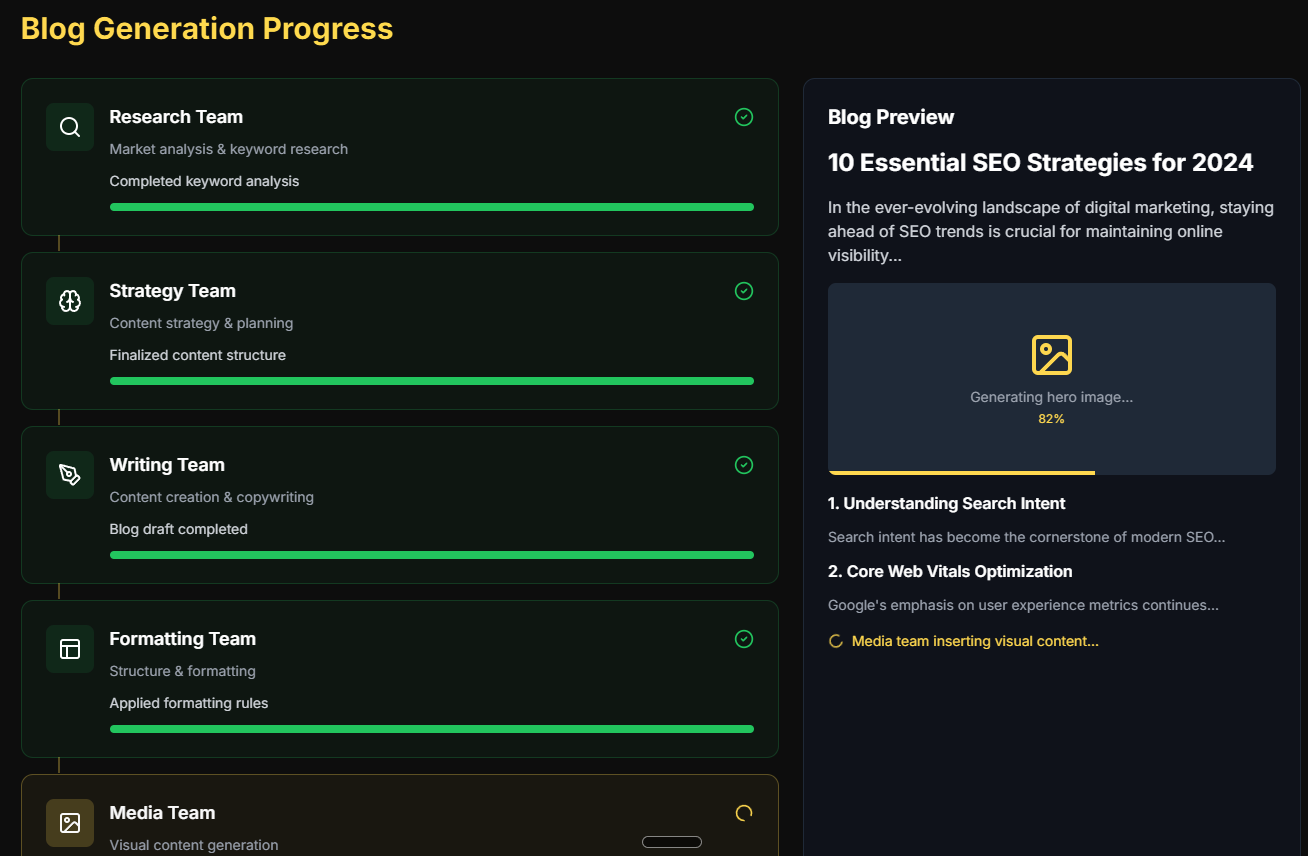Finding the right keywords is often the difference between attracting the right visitors and getting lost in search results. Many businesses struggle to identify which terms their audience actually uses, and manual research can be time-consuming and incomplete.
I've seen how professional keyword research services streamline this process, delivering actionable insights that drive real results. In this article, I'll break down exactly what these services offer, how they operate, and what deliverables you should expect.
You'll learn about the core methodologies, popular tools, and how keyword research fits into broader SEO and content strategies. I'll also compare in-house versus outsourced options, highlight common pitfalls, and explain how AI-powered platforms like SEOSwarm are changing the game.
By the end, you'll know how to evaluate providers, understand pricing models, and avoid costly mistakes—so you can make informed decisions and maximise your digital growth.
What are keyword research services?
Definition and scope of keyword research services
So, what do keyword research services actually do? Picture them as digital guides, uncovering the search terms your audience really uses. Agencies, SEO consultancies, freelancers, or even your own in-house team, all offer these services—focussed on pinpointing words and phrases your actual customers type into search engines.
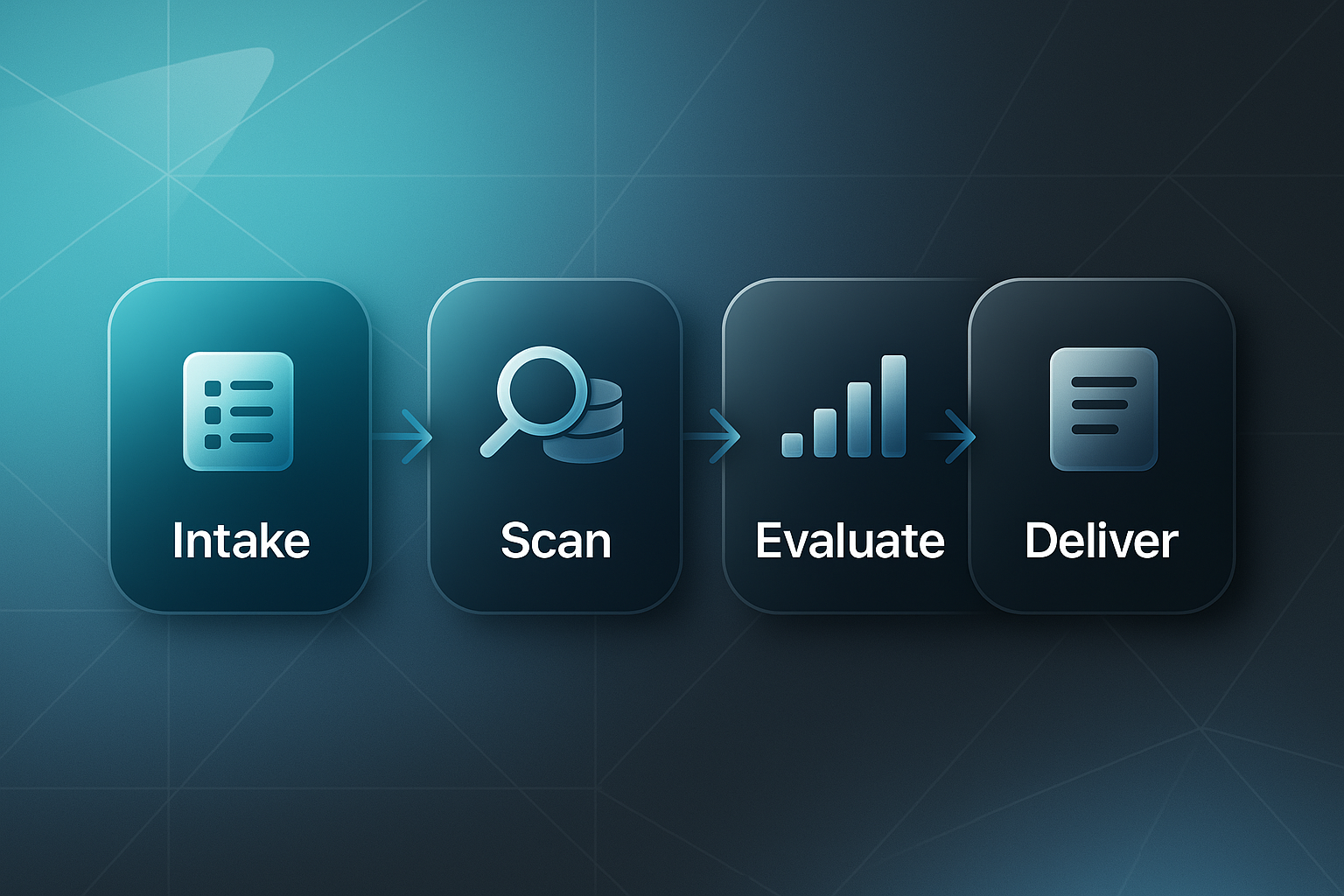
It’s more than grabbing popular phrases. The process explores keyword competitiveness and search intent—whether someone’s researching, preparing to buy, or targeting a specific brand. All insights get matched to your site and campaign goals.
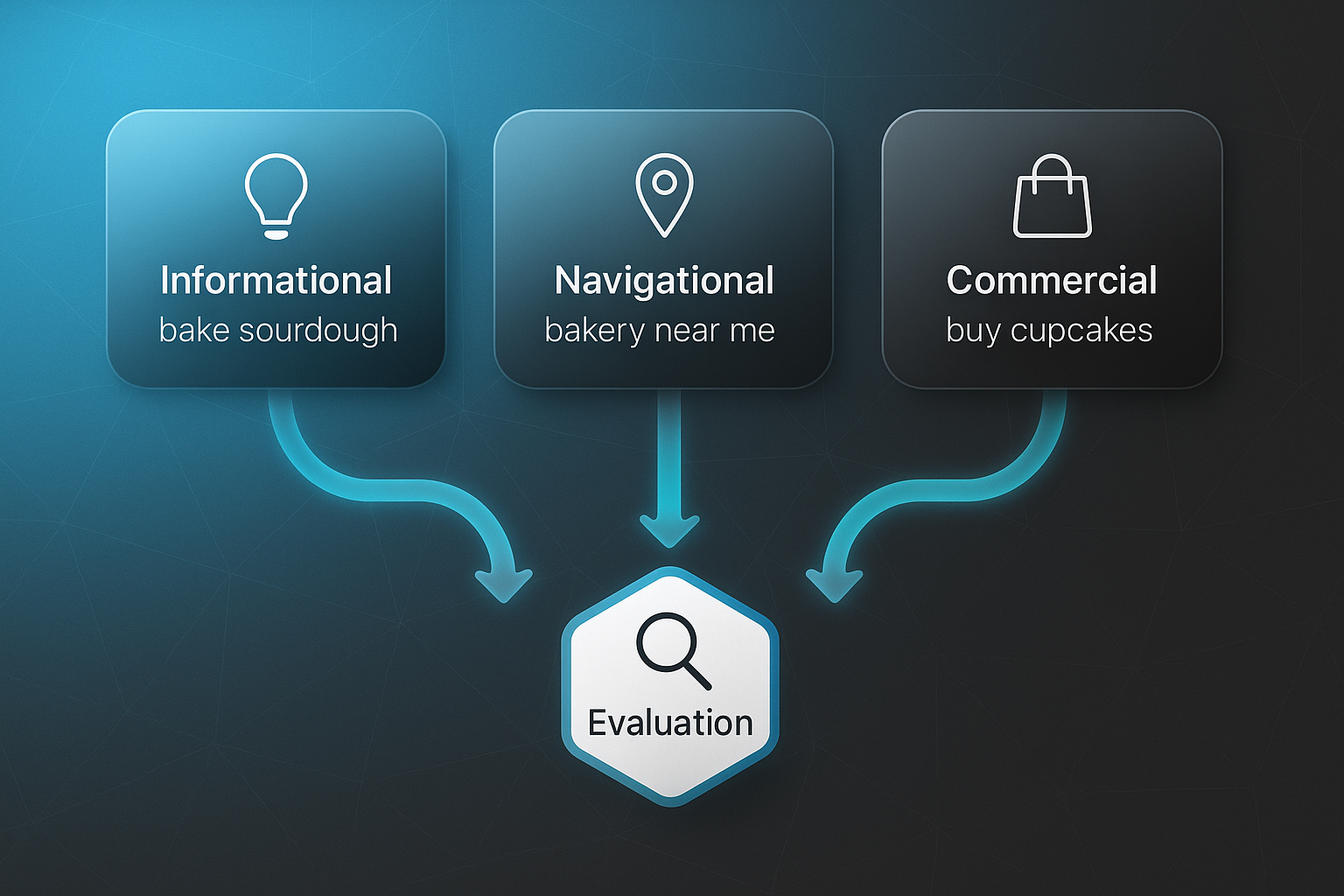
Here’s what you typically receive:
- Comprehensive keyword lists
Keywords sorted by search volume, ranking difficulty, and user intent. - Competitor analysis
Side-by-side comparison showing opportunities your rivals missed. - Search intent classification
Categorises terms as informational, navigational, or commercial. - Keyword mapping
Connects keywords to website areas or specific campaigns. - SERP feature assessment
Finds ways to appear in featured snippets or local lists.
Imagine you own a bakery. Discovering “gluten-free cupcakes” is both popular and under-served? That insight shapes your content and ads.
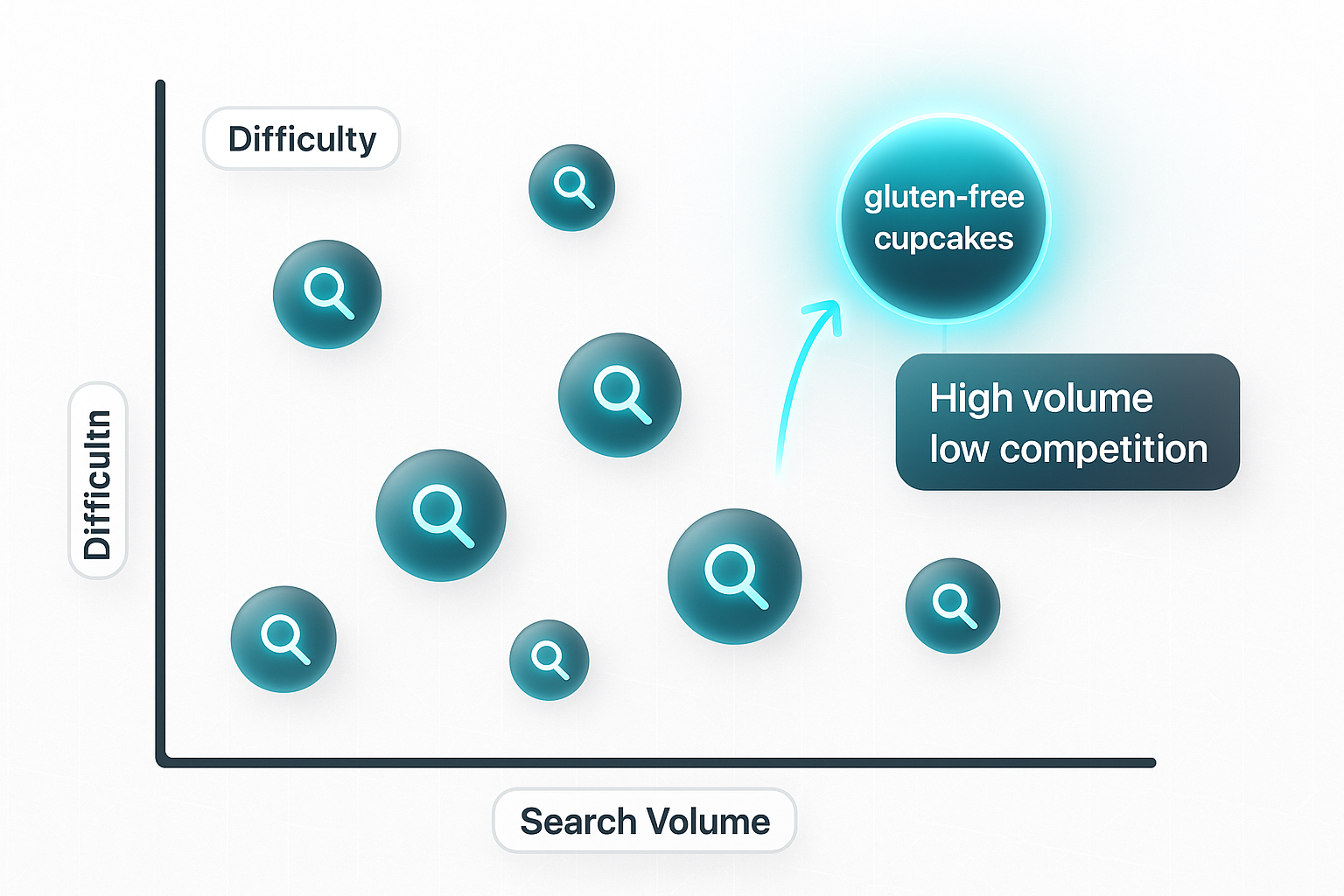
These services fit into broader strategies. For SEO, you shape site structure and on-page content. Content planning picks topics people actually search for. For PPC, focus shifts to keywords proven to convert.
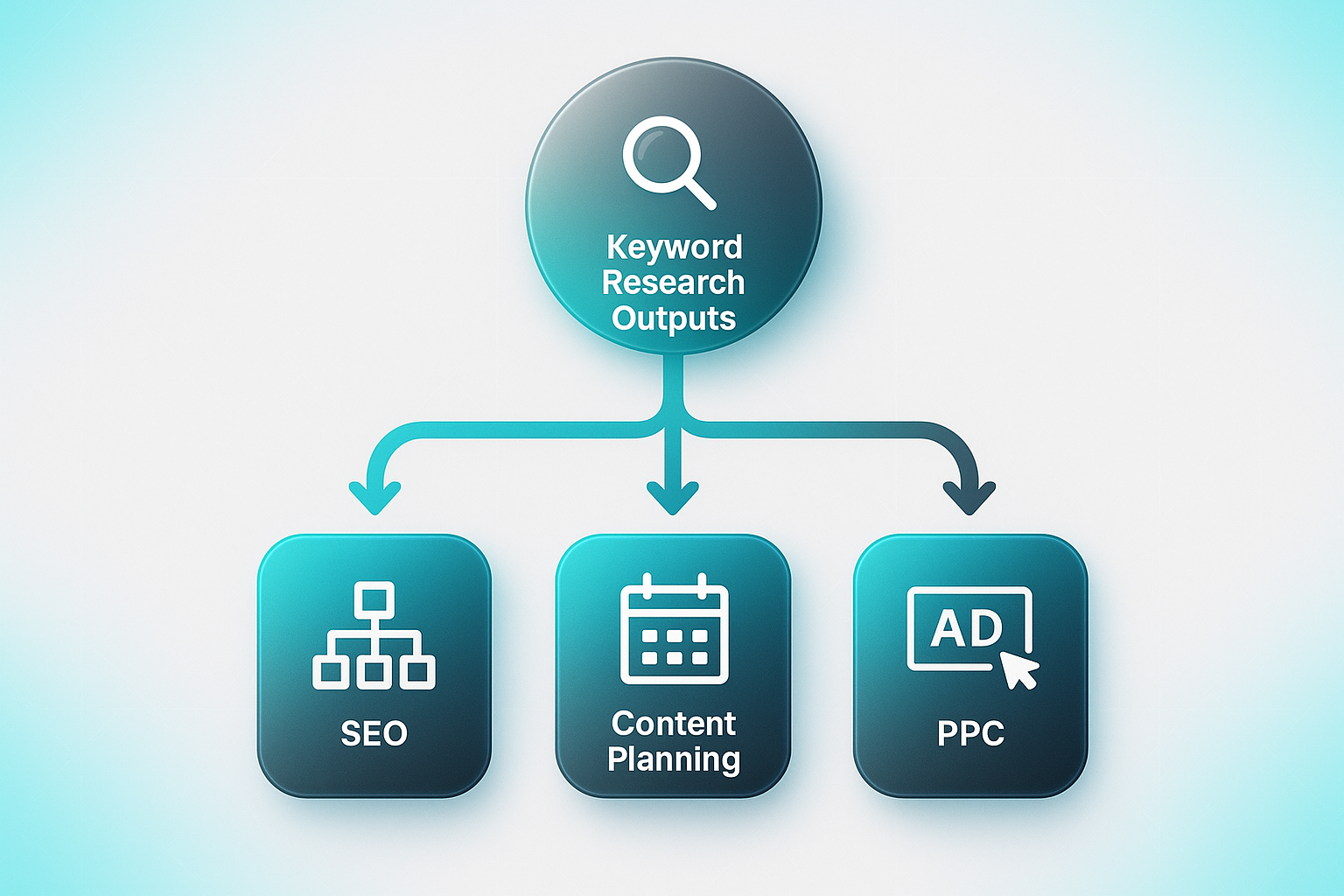
Purpose and core objectives
Why bother with keyword research? The main aim is bringing in traffic that counts—and maximising every penny of digital spend.
Our goal here is to get from a concept, an idea of what our business is and what our website is about and what our customers are searching for, to a list, a big list of keywords that we can then use to prioritize our product development, our content creation, our marketing, our outreach, our PR, all this kind of stuff.
These services drive the right visitors to your site, increasing conversions and digital visibility. They guide content creation, so you answer real questions. Regular reviews mean you keep ahead of competitors and trends.
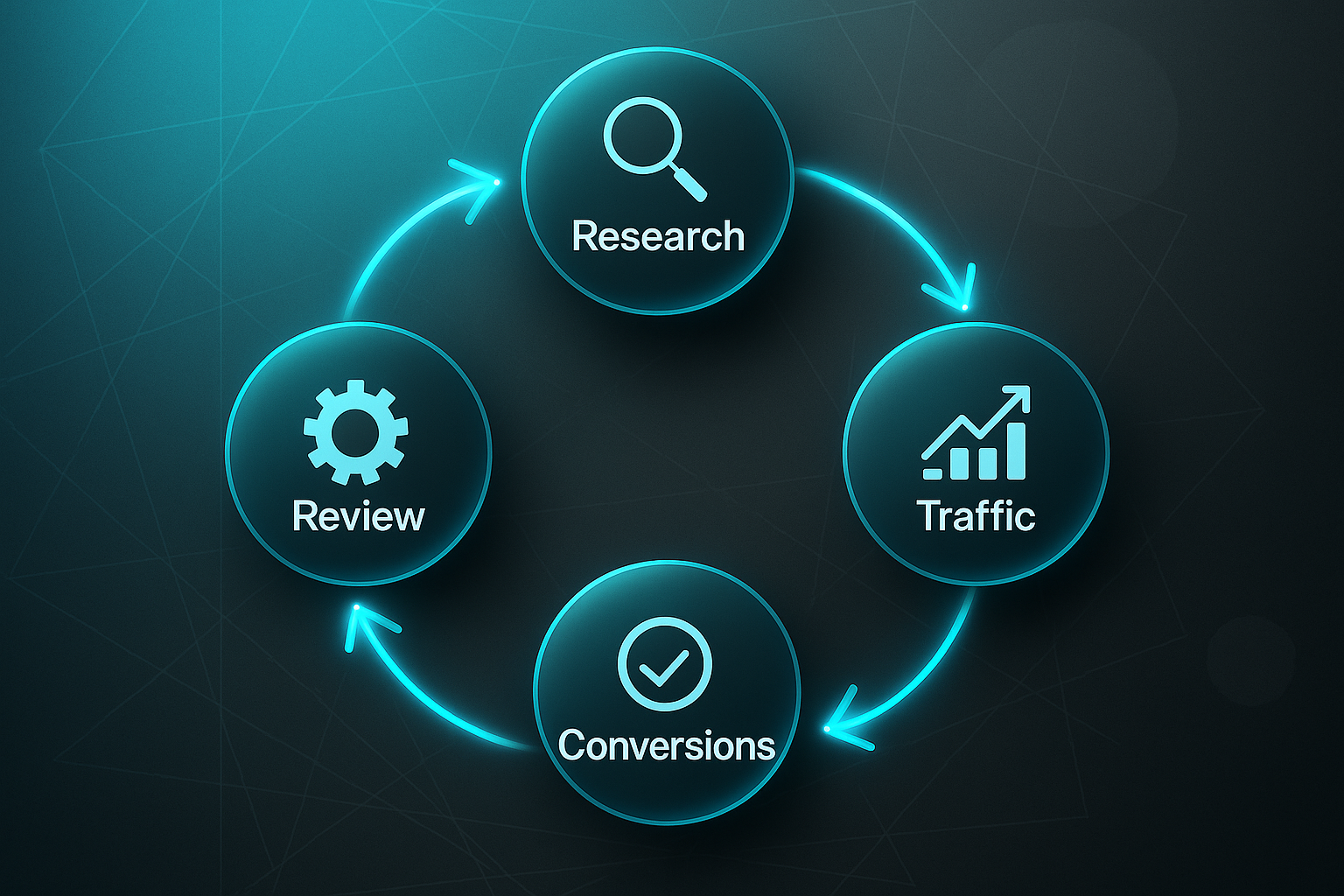
In essence, keyword research provides the strategic foundation for genuine, lasting growth in online marketing.
The importance of keyword research for SEO success
Why keyword research underpins effective SEO
Why is keyword research the backbone of SEO? It simply ensures your content truly reflects what people need and search for.
Nailing search intent—why someone types a query—means your page feels like it was made just for them. That’s what search engines want to show at the top.
Think of someone searching “best accounting software for freelancers”. They’re after information, not a sales pitch. By spotting this, you can tailor your content, drawing in genuinely interested visitors.
Chasing huge keywords like “wallets” really suits global brands. But for a smaller UK retailer, “handmade leather wallets UK” offers less competition, bringing in the kind of shoppers who are already keen to buy.
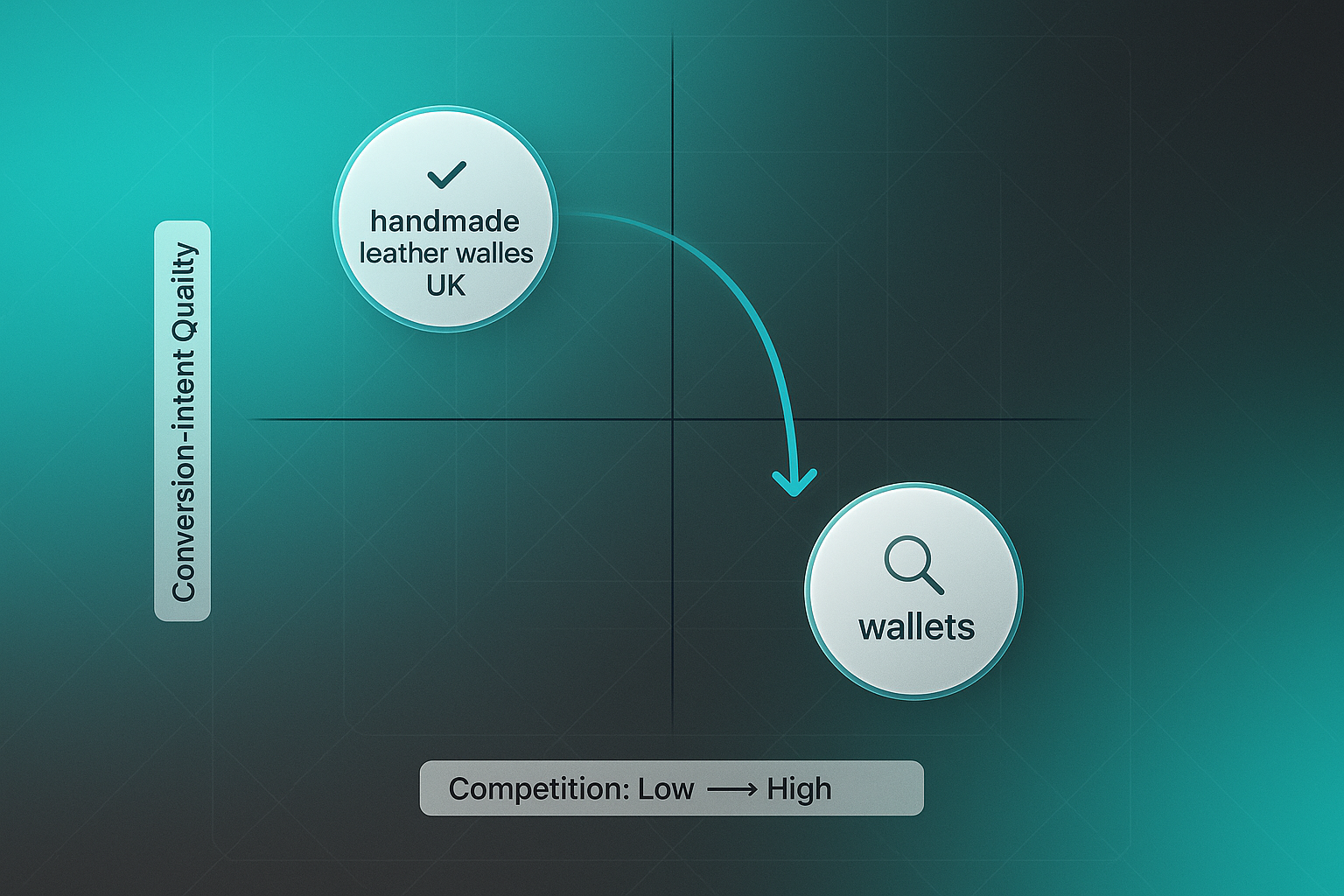
So it’s not simply about getting more visits—it’s about attracting quality traffic that cares. When your content meets visitors where they are, bounce rates fall and people stick around longer.
For publishers and marketers, this shift means a potential trade-off: fewer visitors, but visitors who are more valuable.
That’s the path to building real authority. Trust comes from showing up with useful answers, time and again.
How keyword selection shapes content strategy
Here’s the twist: keyword research doesn’t just help with SEO—it completely shapes your content game plan. By listening to actual searches, you discover what content really matters to people.
Keyword mapping makes every keyword work for a specific page, reducing repetition and letting each page hit a precise target.
Map “eco-friendly packaging solutions” to a dedicated page and you highlight expertise exactly where users expect. This strategic focus sets you apart.
Going after high-intent keywords like “buy standing desk online”? You’re targeting people who are already set to act.
Long-tail keywords get less search traffic, but will usually have a higher conversion value, as they are more specific.
Don’t overlook long-tail queries—those precise, specific searches often convert better than the big, generic ones. That way, your content speaks to real needs… and guides visitors all the way to taking action.
How keyword research services work: Methodologies and processes
Overview of service workflow
Ever wondered how keyword research services really operate behind the scenes? The process kicks off with a discovery session—digging into your business objectives, target audience, core topics, and any quirks in your market or those shifting seasonal patterns.
After that, experts dive into research—scanning your industry and the competition. They’ll spot which keywords your rivals chase, but just as importantly, uncover under-used search terms that help your site stand out.
Keyword mining and evaluation come next. Digital tools churn out a broad pool of keywords, from seed terms to phrases uncovered by competitor analysis. Every keyword is measured for search volume, difficulty, competition, and—most crucially—search intent. The aim? A shortlist set to deliver relevant, valuable traffic aligned to your business priorities.
A full 91% of marketers are using intent data to identify what content should be served within their ABM campaigns, making the practice mainstream.
Tools and technologies used
The right tools make all the difference:
| Tool | Primary Use Case |
|---|---|
| SEMrush | Comprehensive research, competitor analysis, SERP tracking |
| Ahrefs | Keyword and backlink mining, gap analysis |
| Moz | Difficulty scoring, SERP and keyword suggestions |
| Google Keyword Planner | Volume and CPC data, discovering new keywords |
| SEOSwarm (AI) | Clustering, advanced automation, intent recognition |
| SurferSEO (AI) | Content optimisation, SERP data, keyword integration |
Classic options like SEMrush and Ahrefs deliver robust competitor and keyword analysis. AI-powered tools—SEOSwarm and SurferSEO—spot patterns and intent automatically, helping you scale your research and uncover new opportunities fast.
Deliverable types and integration with SEO strategy
So, what do you actually get? Expect curated keyword lists, precisely segmented by user intent and journey stage. Competitor gap reports highlight missed opportunities, and keyword mapping files connect search terms to content assets.
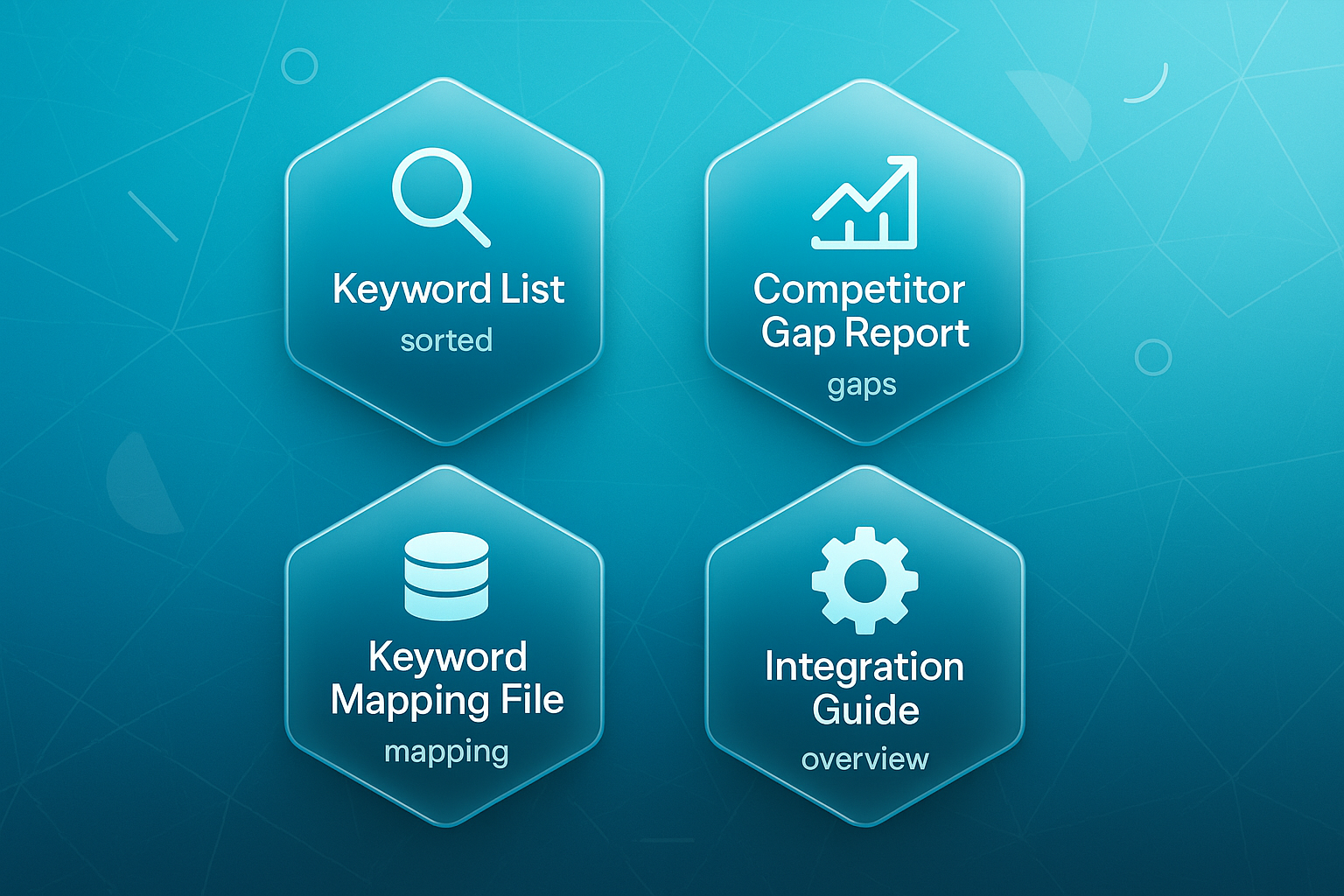
These insights arrive as actionable reports or dashboards, allowing you to monitor progress and shift tactics when needed. Everything filters into your SEO and content plans—guiding calendars, shaping your site, and keeping your strategy attuned to how people actually search. At its best, keyword research turns into the heartbeat of ongoing digital growth.
In-house vs. outsourced keyword research: Pros, cons, and use cases
In-house keyword research
Let’s start with in-house keyword research. Here, your own team—whether that’s marketing, digital, or SEO specialists—handles every step. They plan, research, and refine strategies daily, benefiting from an insider’s understanding of your brand.
The main draw? Total control. Your team sets priorities on a whim, pivots quickly, and ensures each keyword fits your brand’s values and compliance needs. Think about tightly regulated industries like healthcare or finance, where compliance and messaging precision are absolutely critical.
Pros of in-house keyword research
- Direct alignment
Strategy perfectly matches company voice, strict compliance, and in-depth internal knowledge. - Real-time adaptability
Responds instantly to market or business changes. - Cross-functional collaboration
Easy teamwork across departments—great for sectors needing nuanced communication.
However, keeping in-house research sharp takes effort. Recruiting, training, and specialist tools aren’t cheap, and SEO best practices change all the time. During busy seasons or launches, especially, small teams might struggle to keep pace.
Cons of the in-house approach
- Resource-intensive
High ongoing costs for staff, upskilling, and technology. - Expertise maintenance
SEO’s constant evolution means non-stop learning is a must. - Scalability issues
Challenging to respond to sudden spikes in work or major campaigns.
So, who benefits most here? In-house keyword research really shines where regulatory compliance or hands-on control is non-negotiable—think of a large healthcare provider, tightly weaving legal, brand, and marketing strategies together. Sometimes, those close internal connections make all the difference.
Benefits of using professional keyword research services
Key advantages over manual research
Manual keyword research can seem like trying to solve a puzzle with crucial pieces missing. It’s slow, fragmented, and hinges on tools that often aren’t reliable. The time and expertise needed quickly pile up—especially when trends shift or the competition heats up.
Professional services really change the game. By weaving together automation and expert knowledge, they streamline the process into something far more agile. If there’s a sudden viral trend, expert platforms surface actionable insights rapidly—giving you an undeniable edge.
But it’s not only about speed. These services go further, using advanced analytics to understand user intent.
They spot subtle keyword connections, and predict the next search surge. Constant updates mean your strategy can shift smoothly—even if an algorithm throws a curveball.
Time and resource savings
What once took days now takes hours. Automated platforms compress manual tasks, letting you launch campaigns and respond to changes at pace. No more juggling endless tool subscriptions or constant staff training.
Spot a Christmas trend? These services let you act before competitors have a chance.
Advanced expertise and data quality
Instead of stopping at popular terms, professionals dig out hidden long-tail queries and upcoming opportunities. Their algorithms defend your keyword set against shifting search behaviour, making it tougher and more resilient than manual lists.
Quality and scalability for growth
As you scale, maintaining great SEO across brands gets complicated. Professional research anchors best practice, delivers EEAT-compliant output, and avoids thin, outdated content.
Handling multiple campaigns/websites
AI-powered platforms handle numerous campaigns and websites with ease—raising early alerts and surfacing new opportunities, so agencies and brands can pivot quickly.
SEOSwarm’s unique value proposition
SEOSwarm by Precision AI Marketing goes even further. Its agentic AI doesn’t just monitor and adapt in real time—it automates technical SEO, keeping your keyword research robust and scalable for any business.
Evaluating and selecting the right keyword research service
Key criteria for evaluating providers
So, how do you actually choose your keyword research service? Begin by seeking proven expertise—look for professionals using well-regarded, up-to-date tools. Detailed keyword data, competitor insights, and a strategy that’s genuinely tailored to your objectives are essential.
But don’t overlook how user-friendly the interface is, nor how transparently they report outcomes. Integration with your existing SEO tools helps everything run smoothly. Case studies matter more than flashy promises—seeing real successes, especially in your sector, reveals whether they can deliver.
Common mistakes and pitfalls to avoid
But here’s a pitfall many fall into: services offering generic, one-off keyword lists. They might sound useful, but become obsolete fast. If a provider skips search intent, neglects long-tail or local keywords, or drops support after the first delivery—think twice.
Missing regular tracking? That’s another warning sign. If trends shift and your keywords aren’t updated, the strategy quickly loses effectiveness, a bit like relying on an outdated satnav for a road trip.
Aligning with your goals, budget, and scale
It’s vital your chosen agency understands your business’s size and aims. Pricing should be straightforward and flexible—no hidden extras lurking in the fine print. Clarify what’s included, how often reports arrive, and when keyword updates occur.
You want ongoing optimisation. Easy analytics integration keeps your strategy agile, so your keywords can evolve right alongside your business.
Quick reference checklist
| Criteria | What to Look For | Pitfalls to Avoid |
|---|---|---|
| Expertise & Track Record | Industry success, client results, proven impact | No evidence of results or experience |
| Technology & Reporting | Customisation, analytics integration, accuracy | Outdated data, unclear outputs |
| Tailoring for Needs | Custom strategies, ongoing optimisation | Generic, static approaches |
| Transparent Pricing | Clear costs, explicit deliverables | Hidden fees, vague deliverables |
| Ongoing Support | Regular updates, account management | No maintenance or guidance |
What to expect from keyword research services: Deliverables, timelines, and integration
Types of deliverables provided
When you bring in a professional keyword research service, you don’t just get a random list of popular words. What you receive are strategic deliverables designed to bolster both your SEO and broader content plans.
The centrepiece is usually a comprehensive keyword list. Every entry is ranked by search volume, competition, and relevance to your aims.
This takes the guesswork out—showing exactly where your best opportunities lie. Often, keywords arrive grouped by product category, service area, or user journey stage.
That structure makes it easier to spot priorities and plan effective content.
Another vital deliverable? Keyword mapping. This means every key term gets paired with its optimal website page or campaign asset.
It helps you avoid duplication and keeps your site architecture strong. Alongside, you’ll find prioritisation matrices—simple tools that highlight which terms warrant immediate focus for the greatest return.
Competitor benchmarking reports offer direct comparisons with your main rivals. These reports highlight both where competitors excel and the keyword gaps you can exploit to move ahead.
Integration guides round out the package. They translate keyword strategy into specific actions—showing how research feeds directly into content calendars, editorial themes, or campaign plans.
Let’s say there’s a trend for “remote team collaboration tools.” This approach lets you adjust your schedule quickly and capture that demand.
And all this is backed up with practical documentation: mapping sheets, prioritisation tables, and competitor dashboards. That way, everyone—SEO, marketing, and content—works from shared, up-to-date insights for seamless collaboration.
Cost structures, ROI, and budget considerations
Pricing models across provider types
Let’s dig into how keyword research services set their prices—because your choice makes a real difference to your budget and flexibility. Freelancers and consultants usually bill by the hour, around £40 to £150, or quote per project—from £250 up to £2,000+ for more involved work.
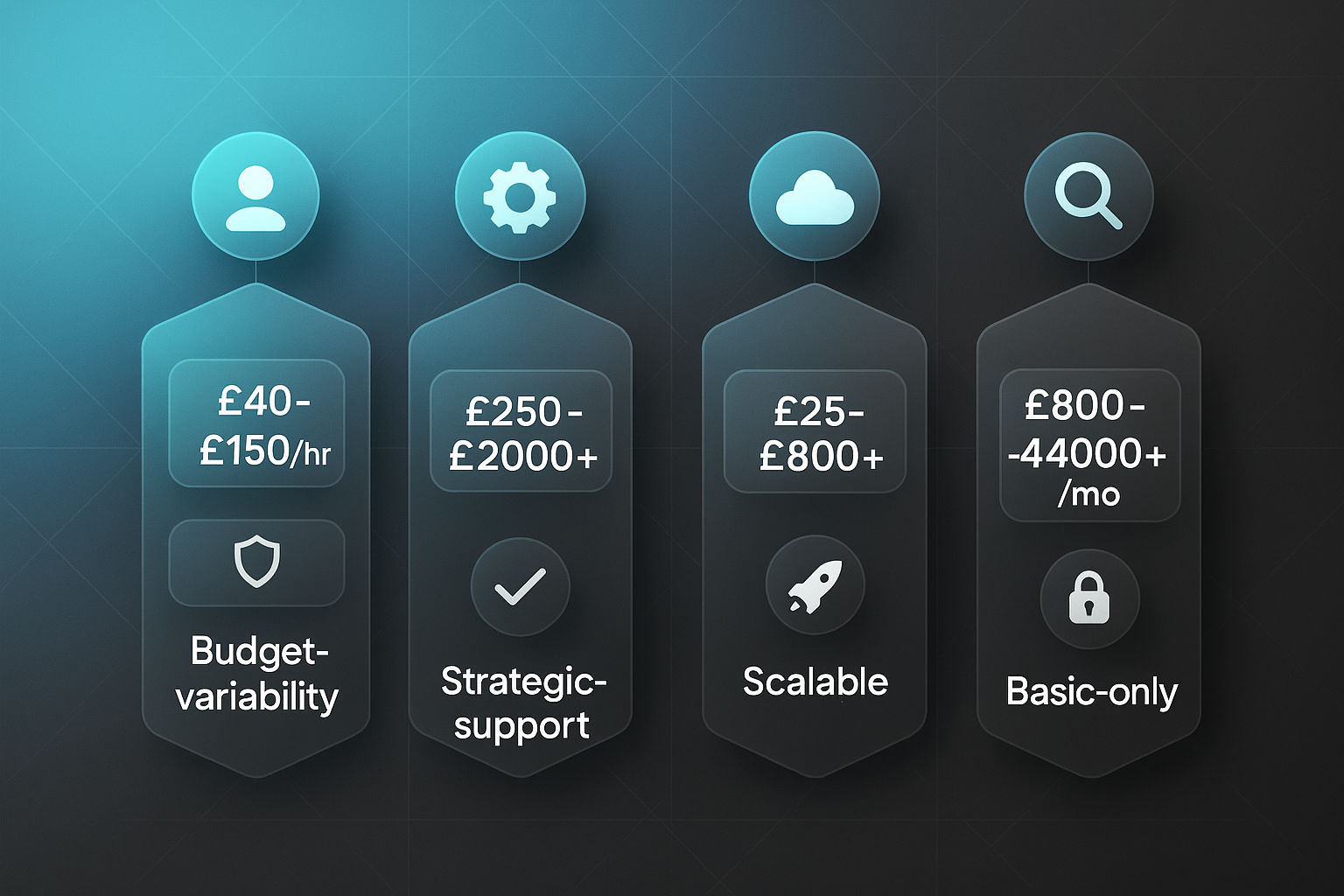
For smaller businesses and startups, this pay-as-you-go approach means you only pay for the help you need, when you need it. But there’s a catch: as your needs expand, costs can start climbing, making long-term budgeting tricky.
Agencies follow a different route. They’ll roll keyword research into broader SEO retainers, starting from about £800 a month and reaching up to £4,000 or more. You get strategy, optimisation, and ongoing support—perfect for ambitious growth, though the commitment is bigger.
Then you have SaaS platforms—think SEOSwarm, Ahrefs, or Moz. Entry-level plans start at £25–£75 monthly, with mid-tier at £150, and enterprise solutions topping £800. This tiered approach lets you control spending and scale up at your own pace.
Just getting started? Free tools like Google Keyword Planner or Ubersuggest are a handy, if basic, way for microbusinesses to test the water.
| Provider Type | Price Range (Monthly/Project) | Predictability | Scalability | Best For |
|---|---|---|---|---|
| Freelancers/Consultants | £250–£2,000/project £40–£150/hr | Moderate | Limited | Small businesses, start-ups |
| Agencies (Retainer) | £800–£4,000+/month | High | Good | Medium–large businesses |
| SaaS Platforms (e.g., SEOSwarm) | £25–£800+/month | Very High | Excellent | All sizes (tiered plans) |
| Free Tools | £0–£25/month | Highest | Low | Microbusinesses, DIY |
Common pitfalls and how to avoid them
Critical mistakes when outsourcing keyword research
Now, when you outsource keyword research, certain missteps can seriously hamper results. Focusing solely on user intent and semantic clustering is vital—otherwise, you’ll end up with a bland keyword list that fails to resonate with real users.
Another common mistake? Chasing only high-volume keywords. Sure, those figures catch the eye, but it’ll attract plenty of unqualified visitors—while valuable long-tail or local terms slip through the cracks.
Case examples: Root causes and impact
True stories from UK businesses highlight why these errors really matter. One mechanical firm’s SEO neglected regional and informational Italian queries, which drove up bounce rates and left conversions languishing. European fashion brands turned it around by clustering long-tail keywords—“warmest winter coat for UK winters” is much more relevant than a generic term.
How to ensure successful outcomes
- Insist on integration and analytics
Link keyword research directly to editorial planning, tracking signals such as click-through and bounce rates. - Demand transparent reporting and communication
Make sure providers share regular updates, letting you adjust strategy wisely.
Getting intent, regional nuance, and integration right transforms outsourced keyword research into a scalable engine for SEO—so your strategy stays robust and responsive.
The rise of AI-powered keyword research: SEOSwarm and next-level solutions
AI-driven methodologies and their advantages
AI-powered keyword research platforms—think SEOSwarm—are changing how businesses find search opportunities. With deep learning and natural language processing, these tools move far beyond static lists, offering nuanced, real-time insights right when you need them.
SEOSwarm’s multi-agent architecture makes all the difference: multiple AI agents team up, each with a specialised task—scanning trends, clustering keywords, and refining recommendations based on live analytics.
This force-multiplies their ability to spot shifts in search behaviour or algorithm changes—fast. Everything, from discovery to clustering and refinement, happens automatically.
AI’s not just quick; it’s remarkably thorough. These systems highlight high-potential groupings, surfacing opportunities manual research would overlook. Automated quality checks and real-world feedback help the list stay laser-focused and relevant.
The upshot? Agility and precision you just won’t get from traditional techniques, putting you ahead of the game.

AI-Powered Content Strategy
See the AI platform that's replacing entire content teams (with better results).
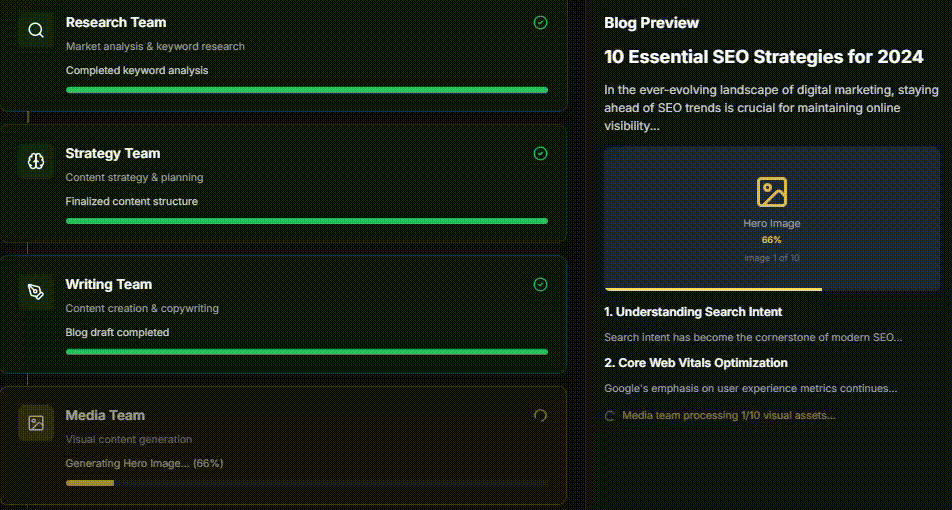
How SEOSwarm compares to traditional agencies and standard SaaS tools
If you’ve worked with typical agencies, you know the routine—static lists or monthly reports that age quickly. SEOSwarm’s system flips that entirely.
Its AI agents analyse thousands of keywords and landing pages in moments. Scalability and speed outpace manual teams and standard SaaS options.
But the real change? Continuous updates. Where agencies might take days to address a hot trend, like a surge in “ai pdf” searches, SEOSwarm adapts targeting and content within hours.
Turning fleeting trends into serious results… that’s the edge.
Impact on business outcomes and the future of SEO
So, what does this actually mean? Companies report organic traffic jumps of up to 25%, and ranking improvements around 30% using platforms like SEOSwarm.
Teams gain time to focus on creativity and big-picture strategy, while AI keeps keyword approaches current in the background.
In a landscape where search behaviour is always shifting, this agility is no longer a ‘nice to have’—it’s critical. SEOSwarm’s agent-driven methodology sets a new standard, making consistent growth and authority possible for any business, whatever its size or budget.
Ongoing maintenance: Keeping keyword strategies fresh and competitive
Why ongoing optimisation is essential
Ever feel like SEO is a moving target? That’s because keyword research isn’t some one-time fix—it’s an ongoing, evolving process. Search engines are constantly updating their algorithms, now focusing even more on natural language and user intent.
And here’s the twist: people’s search habits change just as quickly. What your audience typed last year could be old news today. If you lean on outdated lists, your site may slip in the rankings, since search engines reward pages that are up-to-date, authoritative, and genuinely relevant.
Take law firms, for example. Ignoring trending regulations or new legal topics means losing visibility to more proactive rivals. Retail brands risk missing out too—overlooking the move from “Bluetooth headphones” to “wireless earbuds” could mean losing vital seasonal sales.
Neglecting continual optimisation leads to wasted advert budgets and missed organic opportunities. That competitive edge can quickly erode.
Content hubs that don’t refresh their keyword targeting just… fade. As new trends appear, engagement drops and ad revenue follows.
SEO is evolving... to the growing need for SEOs to think beyond rankings and embrace brand, strategy, and storytelling.
So, in today’s fast-paced digital world, keyword freshness is more than a nice touch—it’s the very foundation for sustainable traffic, conversion rates, and lasting growth.
Industry-specific considerations and customisation
Adapting keyword research to business size and niche
Here’s the thing: keyword research is not one-size-fits-all. Every business needs a customised strategy, suited to its scale and sector. Small firms target local, high-intent keywords and want straightforward reports for quick action.
Mid-sized companies benefit from segmentation—by product, region, or customer type—so they can drive sustained growth. Enterprises look for multi-lingual research, KPI tracking, and rigorous compliance checks, especially where regulation is strict.
Specialist sectors, such as medical or engineering, demand research built around industry-specific language and distinctive buying behaviours.
How industry shapes strategy and provider choice
B2B firms thrive on technical, long-tail queries leading into decision journeys. In contrast, B2C and ecommerce brands bank on trend-driven, transactional keywords. Regulated industries need providers who vet terms for compliance.
Provider expertise is vital. Strategies aligned to your sector’s demands provide a real competitive advantage.
SEOSwarm: Adapting for sector and scale
SEOSwarm’s multi-agent AI crafts strategies for any niche—delivering local targeting, segmentation, or compliance-ready research, and always staying current with market shifts.
Integrating keyword research with digital marketing strategy
How keyword research fuels full-funnel campaigns
Think of keyword research as the engine behind your digital marketing strategy. By grouping keywords to match both user intent and funnel stage, your content meets buyers exactly where they are.
Kick things off with awareness-stage phrases like “best standing desk UK” to reach curious new visitors. Move to consideration-stage queries such as “standing desk vs ergonomic chair” for those weighing up their choices. When it’s crunch time, transactional keywords like “buy ergonomic desk chair London” prompt those all-important conversions.
Practical applications across digital channels
Keyword insights power every touchpoint in your digital ecosystem.
- SEO and website
Shape page titles and structure to fit user intent and journey stage. - PPC campaigns
Build ad groups and messaging around high-converting keywords. - Social media
Select hashtags and topics inspired by the latest search trends. - Email marketing
Align subject lines and content with user interests from keyword clusters.
Regular analytics let you double down on top performers and swap out weaker links, keeping your marketing strategy fresh and fiercely competitive.
Future trends: Automation, AI, and evolving keyword research
Key future directions in keyword research services
Keyword research stands at a turning point, thanks to smarter automation and razor-sharp intent analysis. The industry is being reshaped by semantic search, conversational voice queries, and seamless integration with digital marketing tools.
Semantic search and voice-driven keywords
Today’s platforms go beyond simple word matching—they decode meaning and assemble topic clusters. With voice assistants, people search the way they speak: “Which insulated boots are best for winter walks?” not just “hiking shoes.” To keep up, content must sound natural and answer those spoken questions, boosting chances for featured snippets.
Integration with martech stacks
AI-driven research platforms now plug directly into analytics and CRM systems. This means teams spot trends fast, adapt campaigns instantly, and see insights ripple throughout every marketing channel.
Agentic platforms as category leaders
SEOSwarm’s leadership in automation and analytics
Autonomous, agentic AI platforms—like SEOSwarm—are quietly running research, tweaking strategies, and freeing teams to focus on big, creative thinking. The future really is about agility, visibility, and letting automation handle the heavy lifting.
Case studies and success stories
SEO results and business impact
AI-powered keyword research is delivering impressive results. One personal SaaS site used full AI automation to grow from zero to $10,000 monthly recurring revenue in three months, alongside significant traffic growth. Transit app’s story? By adopting automated programmatic SEO, annual traffic soared 1,134%, scaling its site from hundreds to tens of thousands of pages.
In B2B SaaS, OpenAI-driven clustering shortens the hunt for high-conversion keywords from months to weeks. More precise targeting means better-qualified visitors and higher conversion rates.
Examples of success with SEOSwarm
SEOSwarm’s emerging case studies reflect this. Its agentic automation compresses weeks of keyword and content work into mere hours, letting businesses scale campaigns without extra headcount. Teams get more time for strategy while traffic and authority consistently climb.
Takeaways for decision-makers
The lesson is clear: automation and continual optimisation now enable scalable, ROI-rich campaigns, freeing leaders to focus on strategic growth and keep momentum strong.
Blog-in-one-minute
Add a fully SEO-optimised blog to your website with just 2 lines of code.
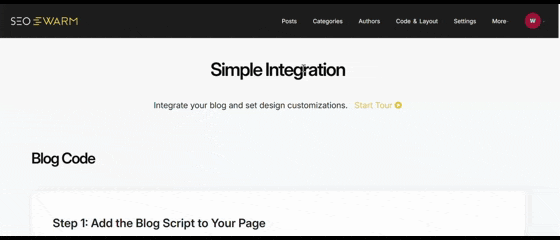
Why Keyword Research Services Matter for Growth
Most businesses chase keywords, but the real winners focus on intent and adaptability. That’s the difference between a site that ranks and one that actually converts. Keyword research services aren’t just about lists—they’re about building a strategy that evolves with your audience and market shifts.
If you’re considering professional help, I recommend you look for three things: - Clear integration with your content and SEO plans - Regular updates and transparent reporting - A provider who understands your sector’s unique needs
Don’t settle for static data or one-off reports. The best results come from ongoing optimisation and a willingness to adjust as trends and algorithms change. In keyword research, staying current isn’t optional—it’s the foundation for lasting growth and authority.
— Wil


